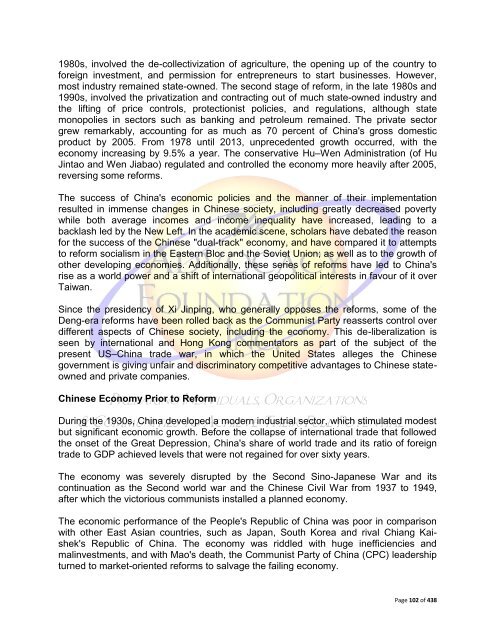Conflicts to Watch in The New Millennium
Conflicts to Watch in The New Millennium
Conflicts to Watch in The New Millennium
- No tags were found...
Create successful ePaper yourself
Turn your PDF publications into a flip-book with our unique Google optimized e-Paper software.
1980s, <strong>in</strong>volved the de-collectivization of agriculture, the open<strong>in</strong>g up of the country <strong>to</strong><br />
foreign <strong>in</strong>vestment, and permission for entrepreneurs <strong>to</strong> start bus<strong>in</strong>esses. However,<br />
most <strong>in</strong>dustry rema<strong>in</strong>ed state-owned. <strong>The</strong> second stage of reform, <strong>in</strong> the late 1980s and<br />
1990s, <strong>in</strong>volved the privatization and contract<strong>in</strong>g out of much state-owned <strong>in</strong>dustry and<br />
the lift<strong>in</strong>g of price controls, protectionist policies, and regulations, although state<br />
monopolies <strong>in</strong> sec<strong>to</strong>rs such as bank<strong>in</strong>g and petroleum rema<strong>in</strong>ed. <strong>The</strong> private sec<strong>to</strong>r<br />
grew remarkably, account<strong>in</strong>g for as much as 70 percent of Ch<strong>in</strong>a's gross domestic<br />
product by 2005. From 1978 until 2013, unprecedented growth occurred, with the<br />
economy <strong>in</strong>creas<strong>in</strong>g by 9.5% a year. <strong>The</strong> conservative Hu–Wen Adm<strong>in</strong>istration (of Hu<br />
J<strong>in</strong>tao and Wen Jiabao) regulated and controlled the economy more heavily after 2005,<br />
revers<strong>in</strong>g some reforms.<br />
<strong>The</strong> success of Ch<strong>in</strong>a's economic policies and the manner of their implementation<br />
resulted <strong>in</strong> immense changes <strong>in</strong> Ch<strong>in</strong>ese society, <strong>in</strong>clud<strong>in</strong>g greatly decreased poverty<br />
while both average <strong>in</strong>comes and <strong>in</strong>come <strong>in</strong>equality have <strong>in</strong>creased, lead<strong>in</strong>g <strong>to</strong> a<br />
backlash led by the <strong>New</strong> Left. In the academic scene, scholars have debated the reason<br />
for the success of the Ch<strong>in</strong>ese "dual-track" economy, and have compared it <strong>to</strong> attempts<br />
<strong>to</strong> reform socialism <strong>in</strong> the Eastern Bloc and the Soviet Union; as well as <strong>to</strong> the growth of<br />
other develop<strong>in</strong>g economies. Additionally, these series of reforms have led <strong>to</strong> Ch<strong>in</strong>a's<br />
rise as a world power and a shift of <strong>in</strong>ternational geopolitical <strong>in</strong>terests <strong>in</strong> favour of it over<br />
Taiwan.<br />
S<strong>in</strong>ce the presidency of Xi J<strong>in</strong>p<strong>in</strong>g, who generally opposes the reforms, some of the<br />
Deng-era reforms have been rolled back as the Communist Party reasserts control over<br />
different aspects of Ch<strong>in</strong>ese society, <strong>in</strong>clud<strong>in</strong>g the economy. This de-liberalization is<br />
seen by <strong>in</strong>ternational and Hong Kong commenta<strong>to</strong>rs as part of the subject of the<br />
present US–Ch<strong>in</strong>a trade war, <strong>in</strong> which the United States alleges the Ch<strong>in</strong>ese<br />
government is giv<strong>in</strong>g unfair and discrim<strong>in</strong>a<strong>to</strong>ry competitive advantages <strong>to</strong> Ch<strong>in</strong>ese stateowned<br />
and private companies.<br />
Ch<strong>in</strong>ese Economy Prior <strong>to</strong> Reform<br />
Dur<strong>in</strong>g the 1930s, Ch<strong>in</strong>a developed a modern <strong>in</strong>dustrial sec<strong>to</strong>r, which stimulated modest<br />
but significant economic growth. Before the collapse of <strong>in</strong>ternational trade that followed<br />
the onset of the Great Depression, Ch<strong>in</strong>a's share of world trade and its ratio of foreign<br />
trade <strong>to</strong> GDP achieved levels that were not rega<strong>in</strong>ed for over sixty years.<br />
<strong>The</strong> economy was severely disrupted by the Second S<strong>in</strong>o-Japanese War and its<br />
cont<strong>in</strong>uation as the Second world war and the Ch<strong>in</strong>ese Civil War from 1937 <strong>to</strong> 1949,<br />
after which the vic<strong>to</strong>rious communists <strong>in</strong>stalled a planned economy.<br />
<strong>The</strong> economic performance of the People's Republic of Ch<strong>in</strong>a was poor <strong>in</strong> comparison<br />
with other East Asian countries, such as Japan, South Korea and rival Chiang Kaishek's<br />
Republic of Ch<strong>in</strong>a. <strong>The</strong> economy was riddled with huge <strong>in</strong>efficiencies and<br />
mal<strong>in</strong>vestments, and with Mao's death, the Communist Party of Ch<strong>in</strong>a (CPC) leadership<br />
turned <strong>to</strong> market-oriented reforms <strong>to</strong> salvage the fail<strong>in</strong>g economy.<br />
Page 102 of 438

















